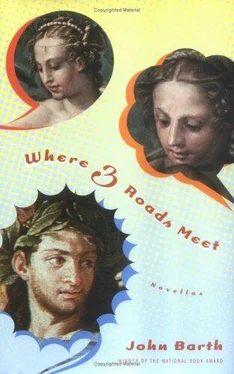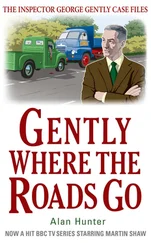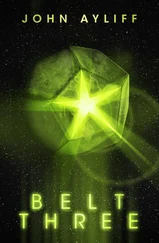"Whoever that might be," he said to himself in effect, if not necessarily in those words; for as the CCHS class of '71's hormones kicked in and cranked up the ambient sexual voltage, and numerous of his schoolmates took their behavioral cues from the still-modest contingent of long-haired dope-smoking war-protesting hippie undergraduates over at the university (as the college became in the 1960s), Phil/ Norm found it ever more difficult to decide who exactly he was, and to dress and behave accordingly. What he felt, but couldn't quite articulate even to himself, was that while one's name is not one's self (any more than one's life story is one's life), his peculiar name was a major determinant of his identity — whatever that might be. Its implicit directive— Fill blank! — led to both hyper-self-consciousness and abnormal self-uncertainty. The selves of his classmates seemed to him bone-deep and plain as day: Billy Marshall the taunting, newly hippie pothead and wannabe rock musician; Elsa Bauer the shy but not un-self-confident, really cute, and almost friendly sophomore class secretary, etc. His own self, on the contrary, seemed to him improvised, tentative, faint, and fluid: a masquerade. An act.
"Now, don't you worry," his mother worried when, in a moment of what had become unusual closeness between her son and anyone, he attempted to confide to her some of the above. "It's just a stage you're going through, honeybun. We all go through stages at your… you know…"
"My stage?"
And not long after, "Now, don't you worry, son," his dad embarrassed him by advising, which meant that Mom had blabbed the whole thing. "One of these days you're going to be somebody. That'll show 'em!"
"Yeah, right."
Kid sister Marsha — who in most respects seemed both to herself and to Philip to be the elder sibling — rolled her self-possessed eyes, but refrained from comment.
As if prompted by the conjunction of an act, a stage, and be somebody, in his latter high school years the young man found himself drawn to theater in general and the school's Drama Club in particular. Alas, although he tried out for a number of productions, it was apparent early on, to him and to the drama coach, that he had no notable thespian gift (compared, say, to Elsa Bauer, whose shyness miraculously vanished when she played another). He managed a few member-of-the-chorus roles — which, on reflection, he found more to his taste anyhow than being one of the play's principals. Even more he enjoyed sitting in the audience in a darkened hall and losing, in some film or stage play, the self that he'd never quite found.
He was, like the rest of his household, an indifferent secular agnostic who gave next to no thought to that noun or its modifiers. The Blanks celebrated Christmas, but observed no Sabbath, prayed no prayers, belonged to no church, and seldom spoke of religion. Son Philip, from age fourteen on, masturbated with about the same frequency as his male classmates, but had no way of knowing that. Managed a few dates in his junior and senior years — one with Elsa Bauer, who permitted him a ceremonial goodnight kiss but was already bespoken (by Billy Marshall) for the senior prom. Attended that function with Betsy Whitmore instead, a pleasant though plump and plain classmate of Marsha, who arranged the date. Neither partner much cared for dancing, but dance they duly did, a bit. Afterward, in the second seat of Billy's parents' two-tone green '69 Pontiac four-door, for appearances' sake they shared a reefer of marijuana and went through the motions of making out (he was permitted to squeeze his date's ample breast, under her blouse but not under her bra, and even briefly, with his other hand, to cup her crotch, under her skirt but not under her pantyhose—"And not a whit more," she seriously joked), to the distracting accompaniment of more vigorous grunts, moans, sighs, and thrashings in the vehicle's front seat. Betsy presently remembered a 1 A.M. parental curfew not previously mentioned; her date "called it an evening" too, forgoing the ritual sunrise breakfast at the class president's house after the all-night party at So-and-So's folks', out past the university's experimental farms.
"Talk about filling in the blanks!" Billy Marshall boasted next day re his and Elsa's front-seat shenanigans. Four years later, like several other high school classmate-sweethearts who elected to stay on at the local university instead of "going off" to college, that couple married, found suitable employment in the area, and raised their own brood in Happy Valley. Betsy Whitmore, however — with whom Phil more or less enjoyed one further date during the summer after his graduation — moved to Michigan with her family soon after, and the young pair did not maintain contact.
Philip himself, having done editorial and layout work on the staff of his high school newspaper, summer-jobbed as an intern with the county's Centre Daily Times and, without seriously considering alternatives, matriculated at "State" in September. His father had suggested a major in Business Administration as most likely to help a fellow without particular ambitions at least to earn a decent living, but did not protest his son's choice of General Arts and Sciences instead: "It's your life, not mine." His mother mildly approved: "Keeps your options open till you find yourself, you know?" Marsha rolled her eyes. Brother and sister were not at all close, but neither was there sibling rivalry or other ill will between them: Their relation was prevailingly cordial and passively affectionate, if somewhat stiff on Philip's part. She was not unhappy when after his freshman year he moved out of the house into the college dorms; but she defended, against her parents' complaints, his junior-year decision to change his name to Philip B. Norman. "Relax," she advised them. "At least he decided something. "
For as a "Stater" herself and adjacent dorm resident by that time, she happened to know that her brother had experimented halfheartedly with changing not only his name and academic major (from General A & S to Pre-Law, then to Business Administration after all, and finally back to General), but his sexual orientation as well. "Hey, Norm," she telephoned him one football weekend after happening to catch sight of her brother and his College of Forestry roommate holding hands in a booth in the Corner Room Restaurant on College Avenue after the Syracuse game, "are you gay these days or what?" Unalarmed by her question, he guessed he maybe was: "Not a word to Mom and Dad, okay?" More surprised and amused than dismayed, "Not to worry!" Marsha assured him, and added, "Better gay than nothing."
But that "stage" lasted no longer than one academic term, whereafter "Phil Norman"'s briefly Significant Other found a roommate/lover more to his liking, and Philip himself became involved with a Poli Sci ex-lesbian as tentative about her sexuality as was he re his. In this same period — between spring break of his junior year and graduation time for the class of '75—ever-cheery Madeline Blank succumbed to metastasized uterine cancer, and her comparatively impassive but now-devastated husband to an evidently self-inflicted deer-rifle shot to the head not long after, in the same state park where the family had often picnicked in Philip's and Marsha's childhood. With a competence that he'd scarcely been aware of possessing, Phil made the arrangements for his dad's cremation and (per deceased's written request, in a terse note found on his body) the discreet dispersal of his ashes along the county roads to which he'd dedicated his working life.
Postponing his baccalaureate for one term, the young man then oversaw the settlement of Michael Blank's uncomplicated estate. Their father and mother having both been only children, Philip and Marsha were the sole surviving family members and equal heirs to their father's modest bank accounts, life insurance benefits, and property. The six-year-old station wagon went to Marsha, as Phil had his own car already; the proceeds from the family house (the sale of which Phil arranged through a local realtor who lived on their block), added to the rest of their inheritance, provided brother and sister with ample funds to rent small but comfortable and convenient apartments near the campus, to purchase whatever supplementary furnishings they needed after dividing their parents' belongings, and to support them comfortably through the remainder of their undergraduate studies and graduate school as well, if they elected to "go on."
Читать дальше












